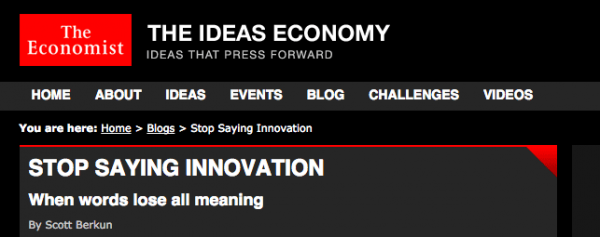George Orwell wrote about what happens when we misuse words. A core theme in the novel 1984 is how abuse of language enables other evils. Well the time has come: I’m stepping up to defend the word Zen.
Zen is in a sorry state of abuse. Much like the word innovation, the word Zen is now a placeholder for thought, used for its connotation of something positive rather than any specific meaning. People often use the word in complete ignorance. Here’s what the word means:
To practice Zen is to use meditation and other techniques to develop an understanding of oneself, and seek spiritual enlightenment
That’s heavy, no? Can you think of a concept more worthy of respect than someone dedicating time to seeking spiritual enlightenment? To understand their true selves? If more people spent time figuring out how to be cool with themselves spiritually (in whatever flavor they choose), instead of accumulating more stuff they don’t need, or taking things that aren’t theirs, we’d be happier all around on this planet. The word Zen, and it’s meaning, gets a top shelf spot on the list of words worthy of reverence and respect.
So how then, can we explain the following?
- Zenhabits.net, a fine site about personal productivity and more, but it’s a lifehacker competitor, not spiritual or even philosophical in focus. Zenhabits also has an e-book called Zen to done, the ultimate productivity system. Why must we suffer these incomprehensible contradictions of Zen and productivity in the same sentence? Simply because the alternatives weren’t cool enough for the author.
- Worse perhaps is CSS Zen Garden, which uses not only the word Zen, but the Japanese rock garden, which are used by some in meditation practices. To their credit, at least they’re giving stuff away, but still. That’s charity garden, not zen. (Why wouldn’t simply CSS Garden have been good enough?)
- Presentation Zen, which is a blog, and book, on professional presentation design. It gives very good advice, but what does this have to do with Zen? Not much. The spirit of the advice is minimalism, an element of many eastern philosophies, but minimalism is not spiritual by itself. I know Garr Reynolds and I like him and his presentation advice, but the question remains. Most presentations are capitalistic and not spiritual acts.
- Of course we also have ZenCart, a shopping cart service, the Zen drupal theme, an MP3 player, a communal blog, and an Internet provider.
Some of these things are good and people like them, but they have nothing to do with Zen. The word is decoration. It’s a marketing hook, used to suggest but not provide. Many use visual imagery that vaguely suggests eastern philosophy, but it’s purely visual. The superficial without the substance.
I’m no saint of titles. I took criticism from friends for titling my first book The art of project management, as “The art of…” is perhaps the most cliche title in the world (Perhaps I’m redeemed by the name change, perhaps not). But unlike the sites above, a cliche title can accurately describe what is being offered, without the material itself being cliche.
These sites use this amazing word, Zen, fun to say, beautifully compact, high in noble purpose, and use it for decoration. Orwell would claim these folks are both benefiting from the dilution of language, and promoting the further gutting of an enlightenment-path into a for profit choice of branding style. Ok. Forget Orwell, he’s dead and can’t speak for himself: So I make that claim. This is bad for everyone. How bad? I have no idea as we’ve been doing this to words and ideas for a long time.
From my skimmings of these sites, these folks are smart. I’m sure they all knew synonyms for good, great, cool, or whatever it was they were looking for could be found in any thesaurus. They could have been industrious enough to make up their own name or hire someone to do it for them. They could even have stooped, like I did, to reuse a naming cliche (Secrets of, Art of, etc.). But instead they chose to drag a word like Zen into the laziest kind of intellectual mud.
Certainly, these folks have company. Many point the finger at Robert Pirsig’s Zen and the art of motorcycle maintenance for starting the trend. It’s an excellent book on one man’s explorations into philosophy and life, but Zen is a sideline. Of course Pirsig was probably riffing off of Herrigel’s Zen in the art of archery. That book actually is about Zen, and the attempt by a Westerner to practice it. It should be required reading (despite its flaws) for anyone who even thinks about taking command of the Z-word for their own profit.
If you’re curious about Zen, I’m no expert. Here’s a good experience to start with. I bet you’ll be surprised. (flash site, but worth the ride).
The single best book introducing meditation (and by-proxy Zen & Buddhism), is Turning the Mind into an ally. Highly recommended (it’s the best of many I’ve read).


